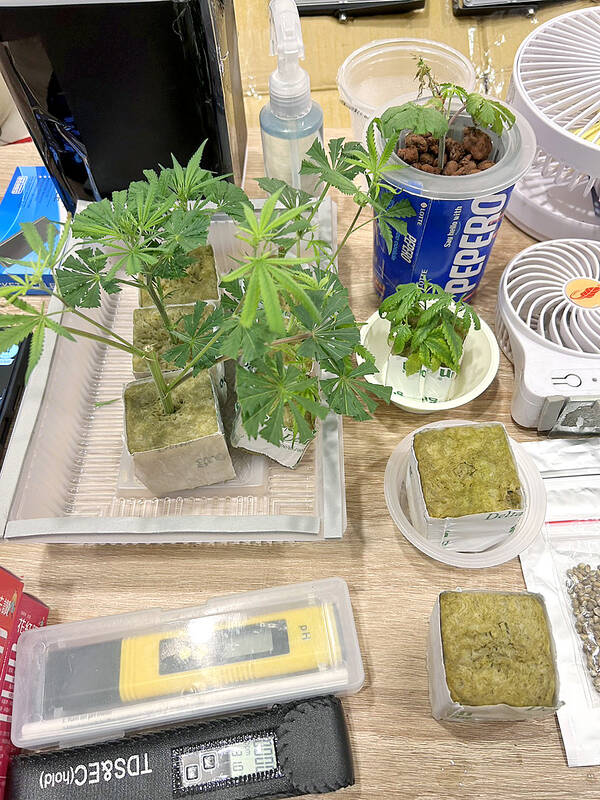Police in Keelung last week urged people to temper their curiosity about cannabis horticulture and not buy seeds of the category 2 drug online, as it remains illegal to use, grow, transport and distribute.
Keelung City Police Department Criminal Investigation Division Second Corp Captain Lin Hsueh-chih (林學志) on Monday last week said that while marijuana has medicinal uses, it remains illegal to import seeds and grow the plant in Taiwan.
Recently, several people have bought cannabis seeds online with the intent to grow, with a seller directly mailing packages to buyers to circumvent regulations, Lin said.

Photo copied by Wu Sheng-ju, Taipei Times
The police department said it last year pursued more than 20 cases of people seeking to grow cannabis, most of whom had purchased the seeds over the Internet.
Some of the buyers said they intended to grow the plants for personal use, but others said they bought the seeds to challenge their horticulture skills, as they heard it could be difficult to cultivate, it said.
The cannabis agriculture enthusiasts included office workers, engineers, foreign workers and students, it said.
After being alerted to graduate students seeking to buy cannabis seeds online, the police obtained a warrant to search one of the students’ apartments, it said.
Police said the student told them that they were just curious about what a cannabis plant looked like, adding that they did not expect to succeed at growing one.
Another incident involved a worker from Thailand, who told police that they grew cannabis for personal consumption — making a tea with the leaves, the police said.
While legal amendments in the past few years have adjusted the sentencing based on a person’s intent for growing cannabis — whether for sale or personal use — the act itself is still illegal, lawyer Ko Lin-hung (柯林宏) said.
Under article 13 of the Narcotics Hazard Prevention Act (毒品危害防制條例), people convicted of transporting or selling cannabis seeds with intent to provide for cultivation face a minimum of two years in prison and a fine of no more than NT$200,000 (US$6,361).
The Legislative Yuan in 2022 passed amendments to the act that changed the sentencing for people who grow cannabis for personal use, without intent to distribute, Ko said.
The sentence was reduced from the original five years in prison to a minimum of one year, up to a maximum of seven years, he added.
The amendment also reduced the fine from NT$5 million to a maximum of NT$1 million, he said.

Alain Robert, known as the "French Spider-Man," praised Alex Honnold as exceptionally well-prepared after the US climber completed a free solo ascent of Taipei 101 yesterday. Robert said Honnold's ascent of the 508m-tall skyscraper in just more than one-and-a-half hours without using safety ropes or equipment was a remarkable achievement. "This is my life," he said in an interview conducted in French, adding that he liked the feeling of being "on the edge of danger." The 63-year-old Frenchman climbed Taipei 101 using ropes in December 2004, taking about four hours to reach the top. On a one-to-10 scale of difficulty, Robert said Taipei 101

Nipah virus infection is to be officially listed as a category 5 notifiable infectious disease in Taiwan in March, while clinical treatment guidelines are being formulated, the Centers for Disease Control (CDC) said yesterday. With Nipah infections being reported in other countries and considering its relatively high fatality rate, the centers on Jan. 16 announced that it would be listed as a notifiable infectious disease to bolster the nation’s systematic early warning system and increase public awareness, the CDC said. Bangladesh reported four fatal cases last year in separate districts, with three linked to raw date palm sap consumption, CDC Epidemic Intelligence

Two Taiwanese prosecutors were questioned by Chinese security personnel at their hotel during a trip to China’s Henan Province this month, the Mainland Affairs Council (MAC) said yesterday. The officers had personal information on the prosecutors, including “when they were assigned to their posts, their work locations and job titles,” MAC Deputy Minister and spokesman Liang Wen-chieh (梁文傑) said. On top of asking about their agencies and positions, the officers also questioned the prosecutors about the Cross-Strait Joint Crime-Fighting and Judicial Mutual Assistance Agreement, a pact that serves as the framework for Taiwan-China cooperation on combating crime and providing judicial assistance, Liang

US climber Alex Honnold left Taiwan this morning a day after completing a free-solo ascent of Taipei 101, a feat that drew cheers from onlookers and gained widespread international attention. Honnold yesterday scaled the 101-story skyscraper without a rope or safety harness. The climb — the highest urban free-solo ascent ever attempted — took just more than 90 minutes and was streamed live on Netflix. It was covered by major international news outlets including CNN, the New York Times, the Guardian and the Wall Street Journal. As Honnold prepared to leave Taiwan today, he attracted a crowd when he and his wife, Sanni,